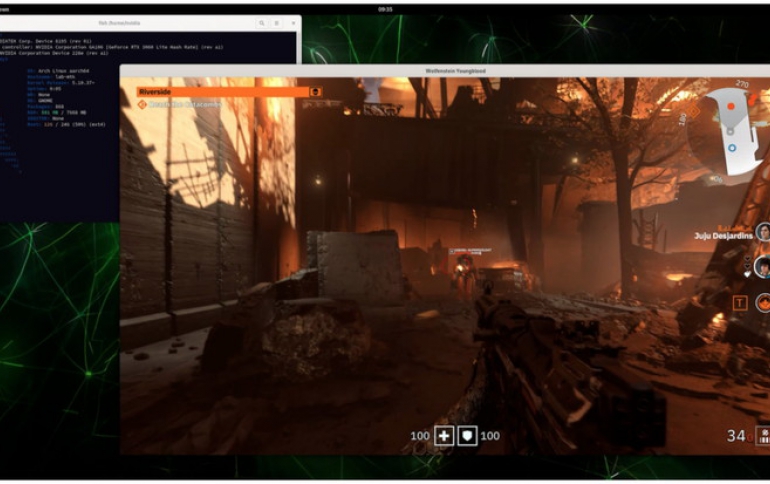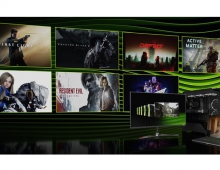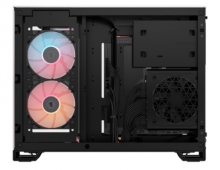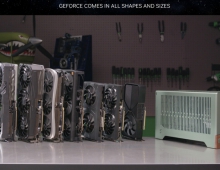
Arm Is RTX ON! World’s Most Widely Used CPU Architecture Meets Real-Time Ray Tracing, DLSS
A pair of new demos running GeForce RTX technologies on the Arm platform unveiled by NVIDIA today show how advanced graphics can be extended to a broader, more power-efficient set of devices.
The two demos, shown at this week’s Game Developers Conference, included Wolfenstein: Youngblood from Bethesda Softworks and MachineGames, as well as The Bistro from the Open Research Content Archive running in real time on a MediaTek Arm platform with ray-traced graphics.
RTX has redefined the industry. We’re now investing in new platforms where we can deploy advanced graphics so gamers have more choice. The performance and energy efficiency of ARM CPUs with NVIDIA technologies can open an entirely new class of PCs.
“RTX is the most groundbreaking technology to come to PC gaming in the last two decades,” said PC Tseng, general manager of MediaTek’s Intelligent Multimedia Business Unit.“MediaTek and NVIDIA are laying the foundation for a new category of Arm-based high-performance PCs.”
RTX on Arm in Action
Showing the potential for NVIDIA RTX on Arm, developer Machine Games packed the Wolfenstein: Youngblood demo with beautiful, ray-traced reflections, all accelerated by NVIDIA DLSS, which uses GPU-accelerated deep-learning algorithms to boost frame rates.
NVIDIA also showed how RTX can enhance the The Bistro demo, which portrays a detailed, ray-traced urban scene in France, while running on an Arm-based system.
Both were demonstrated on an NVIDIA GeForce RTX 3060 GPU paired with a MediaTek Kompanio 1200 Arm processor. Wolfenstein: Youngblood uses the idTech game engine made by id Software, while The Bistro uses NVIDIA’s sample framework.
hey include:
Deep Learning Super Sampling (DLSS), which uses AI to boost frame rates and generate beautiful, sharp images for games
RTX Direct Illumination (RTXDI), which lets developers add dynamic lighting to their gaming environments
RTX Global Illumination (RTXGI), which helps recreate the way light bounces around in real-world environments
NVIDIA Real-Time Denoisers (NRD), a denoising library that’s designed to work with low ray per pixel signals
RTX Memory Utility (RTXMU), which optimizes the way applications use graphics memory
The Potential for RTX on ARM
GeForce RTX technologies — including GPU-accelerated ray tracing, NVIDIA DLSS and other AI-powered innovations — have made a significant impact on real-time graphics since their introduction in 2018.
The world’s leading publishers have used NVIDIA RTX technologies to set apart their top franchises. RTX technologies are now available in an all-star list of gaming franchises, including Battlefield, Call of Duty, Cyberpunk, DEATH STRANDING, Doom, Final Fantasy, Fortnite, LEGO, Minecraft, Quake, Rainbow Six, Red Dead Redemption, Rust, Tomb Raider, Watch Dogs and Wolfenstein.
The news garnered widespread industry support.
“NVIDIA extending RTX support to Arm and Linux has the potential to benefit games and industries such as automotive, where leading manufacturers use Unreal Engine not only for design visualization but also for digital cockpits and infotainment” said Nick Penwarden, vice president of engineering, Epic Games. “We always welcome powerful features and SDKs that can be leveraged across many platforms.”
“Wolfenstein: Youngblood is the first RTX PC game to be shown on an Arm-based system, a testament to the flexibility, power and optimized nature of the iD Tech engine,” said Machinegames CTO Jim Kjellin. “An iD Tech-based game running on an Arm CPU with ray tracing enabled is a significant step in a journey that will result in many more gaming platforms being available to all game developers.”
“RTX support for Arm and Linux opens up new opportunities for game developers to provide more immersive experiences on a wider variety of platforms,” said Mathieu Muller, senior technical product manager of high-end graphics at Unity. “With GeForce RTX’s cutting-edge graphics features, Unity developers targeting Arm platforms will have more tools in their toolbox to create with.”
The RTXDI, NRD and RTXMU SDKs for Arm with Linux and Chromium are available now. RTXGI and DLSS will be coming soon. For more information, contact NVIDIA’s developer relations team or visit www.https://developer.nvidia.com.





















